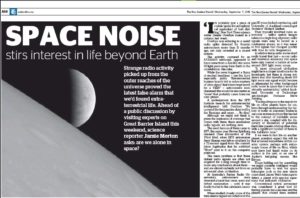Ahead of a public talk by international experts on Great Barrier Island this weekend, NZ Herald science reporter Jamie Morton asks: is there anyone else out there?
 An excerpt (read in full):
An excerpt (read in full):
Meanwhile, the hunt for extra-terrestrial life goes on, and SETI continues to monitor radio waves from space for signs they were created by an intelligent alien culture.
While radio telescopes have become more powerful and numerous across the planet – Auckland University of Technology (AUT) runs a 12-metre device at Warkworth – the challenge isn’t with the technology itself, but with the tricky nature of what’s actually being captured.
In relative terms, radio waves don’t really travel that fast – so our radio and television emissions into space have created a bubble of noise stretching only around 200 light years across.
“A more advanced civilisation might have a longer timeframe for its broadcasts, but there is strong evidence that after travelling about 100 light years any signal would become so attenuated by other background radio ‘noise’ in space that it would be virtually undetectable,” said AUT astrobiologist Professor Steve Pointing.
“The big advances in the search for life on other planets have, for me, been through understanding the history of water on planetary bodies in our solar system and how this has led to the concept of habitable zones around a star, coupled with the discovery of thousands of potential Earth-like planets orbiting other stars, with a significant number of them in this habitable zone.”
If we were to find life on another planet, scientists expect this will be first achieved somewhere within our own backyard: perhaps with traces of life on Mars, which may have had liquid water on its surface in the past, or on one of Jupiter’s intriguing moons.